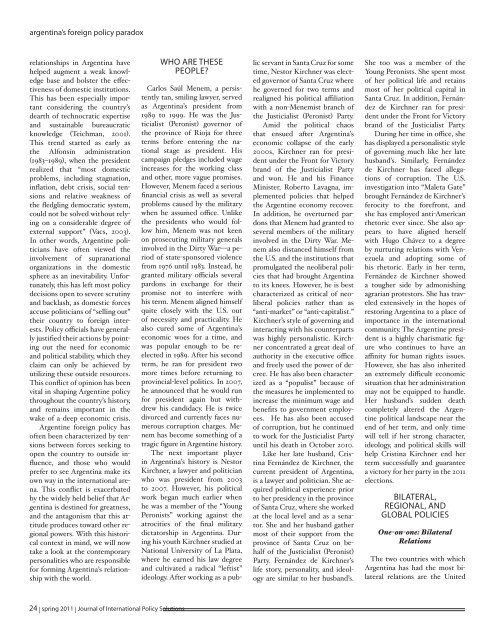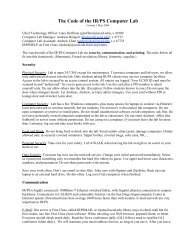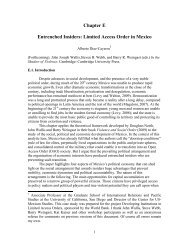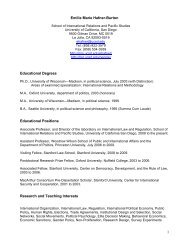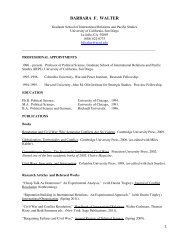to download the full journal. (1.2MB PDF) - School of International ...
to download the full journal. (1.2MB PDF) - School of International ...
to download the full journal. (1.2MB PDF) - School of International ...
You also want an ePaper? Increase the reach of your titles
YUMPU automatically turns print PDFs into web optimized ePapers that Google loves.
argentina’s foreign policy paradox<br />
relationships in Argentina have<br />
helped augment a weak knowledge<br />
base and bolster <strong>the</strong> effectiveness<br />
<strong>of</strong> domestic institutions.<br />
This has been especially important<br />
considering <strong>the</strong> country’s<br />
dearth <strong>of</strong> technocratic expertise<br />
and sustainable bureaucratic<br />
knowledge (Teichman, 2001).<br />
This trend started as early as<br />
<strong>the</strong> Alfonsín administration<br />
(1983–1989), when <strong>the</strong> president<br />
realized that “most domestic<br />
problems, including stagnation,<br />
inflation, debt crisis, social tensions<br />
and relative weakness <strong>of</strong><br />
<strong>the</strong> fledgling democratic system,<br />
could not be solved without relying<br />
on a considerable degree <strong>of</strong><br />
external support” (Vacs, 2003).<br />
In o<strong>the</strong>r words, Argentine politicians<br />
have <strong>of</strong>ten viewed <strong>the</strong><br />
involvement <strong>of</strong> supranational<br />
organizations in <strong>the</strong> domestic<br />
sphere as an inevitability. Unfortunately,<br />
this has left most policy<br />
decisions open <strong>to</strong> severe scrutiny<br />
and backlash, as domestic forces<br />
accuse politicians <strong>of</strong> “selling out”<br />
<strong>the</strong>ir country <strong>to</strong> foreign interests.<br />
Policy <strong>of</strong>ficials have generally<br />
justified <strong>the</strong>ir actions by pointing<br />
out <strong>the</strong> need for economic<br />
and political stability, which <strong>the</strong>y<br />
claim can only be achieved by<br />
utilizing <strong>the</strong>se outside resources.<br />
This conflict <strong>of</strong> opinion has been<br />
vital in shaping Argentine policy<br />
throughout <strong>the</strong> country’s his<strong>to</strong>ry,<br />
and remains important in <strong>the</strong><br />
wake <strong>of</strong> a deep economic crisis.<br />
Argentine foreign policy has<br />
<strong>of</strong>ten been characterized by tensions<br />
between forces seeking <strong>to</strong><br />
open <strong>the</strong> country <strong>to</strong> outside influence,<br />
and those who would<br />
prefer <strong>to</strong> see Argentina make its<br />
own way in <strong>the</strong> international arena.<br />
This conflict is exacerbated<br />
by <strong>the</strong> widely held belief that Argentina<br />
is destined for greatness,<br />
and <strong>the</strong> antagonism that this attitude<br />
produces <strong>to</strong>ward o<strong>the</strong>r regional<br />
powers. With this his<strong>to</strong>rical<br />
context in mind, we will now<br />
take a look at <strong>the</strong> contemporary<br />
personalities who are responsible<br />
for forming Argentina’s relationship<br />
with <strong>the</strong> world.<br />
WHO ARE THESE<br />
PEOPLE?<br />
Carlos Saúl Menem, a persistently<br />
tan, smiling lawyer, served<br />
as Argentina’s president from<br />
1989 <strong>to</strong> 1999. He was <strong>the</strong> Justicialist<br />
(Peronist) governor <strong>of</strong><br />
<strong>the</strong> province <strong>of</strong> Rioja for three<br />
terms before entering <strong>the</strong> national<br />
stage as president. His<br />
campaign pledges included wage<br />
increases for <strong>the</strong> working class<br />
and o<strong>the</strong>r, more vague promises.<br />
However, Menem faced a serious<br />
financial crisis as well as several<br />
problems caused by <strong>the</strong> military<br />
when he assumed <strong>of</strong>fice. Unlike<br />
<strong>the</strong> presidents who would follow<br />
him, Menem was not keen<br />
on prosecuting military generals<br />
involved in <strong>the</strong> Dirty War—a period<br />
<strong>of</strong> state-sponsored violence<br />
from 1976 until 1983. Instead, he<br />
granted military <strong>of</strong>ficials several<br />
pardons in exchange for <strong>the</strong>ir<br />
promise not <strong>to</strong> interfere with<br />
his term. Menem aligned himself<br />
quite closely with <strong>the</strong> U.S. out<br />
<strong>of</strong> necessity and practicality. He<br />
also cured some <strong>of</strong> Argentina’s<br />
economic woes for a time, and<br />
was popular enough <strong>to</strong> be reelected<br />
in 1989. After his second<br />
term, he ran for president two<br />
more times before returning <strong>to</strong><br />
provincial-level politics. In 2007,<br />
he announced that he would run<br />
for president again but withdrew<br />
his candidacy. He is twice<br />
divorced and currently faces numerous<br />
corruption charges. Menem<br />
has become something <strong>of</strong> a<br />
tragic figure in Argentine his<strong>to</strong>ry.<br />
The next important player<br />
in Argentina’s his<strong>to</strong>ry is Nes<strong>to</strong>r<br />
Kirchner, a lawyer and politician<br />
who was president from 2003<br />
<strong>to</strong> 2007. However, his political<br />
work began much earlier when<br />
he was a member <strong>of</strong> <strong>the</strong> “Young<br />
Peronists” working against <strong>the</strong><br />
atrocities <strong>of</strong> <strong>the</strong> final military<br />
dicta<strong>to</strong>rship in Argentina. During<br />
his youth Kirchner studied at<br />
National University <strong>of</strong> La Plata,<br />
where he earned his law degree<br />
and cultivated a radical “leftist”<br />
ideology. After working as a public<br />
servant in Santa Cruz for some<br />
time, Nes<strong>to</strong>r Kirchner was elected<br />
governor <strong>of</strong> Santa Cruz where<br />
he governed for two terms and<br />
realigned his political affiliation<br />
with a non-Menemist branch <strong>of</strong><br />
<strong>the</strong> Justicialist (Peronist) Party.<br />
Amid <strong>the</strong> political chaos<br />
that ensued after Argentina’s<br />
economic collapse <strong>of</strong> <strong>the</strong> early<br />
2000s, Kirchner ran for president<br />
under <strong>the</strong> Front for Vic<strong>to</strong>ry<br />
brand <strong>of</strong> <strong>the</strong> Justicialist Party<br />
and won. He and his Finance<br />
Minister, Rober<strong>to</strong> Lavagna, implemented<br />
policies that helped<br />
<strong>the</strong> Argentine economy recover.<br />
In addition, he overturned pardons<br />
that Menem had granted <strong>to</strong><br />
several members <strong>of</strong> <strong>the</strong> military<br />
involved in <strong>the</strong> Dirty War. Menem<br />
also distanced himself from<br />
<strong>the</strong> U.S. and <strong>the</strong> institutions that<br />
promulgated <strong>the</strong> neoliberal policies<br />
that had brought Argentina<br />
<strong>to</strong> its knees. However, he is best<br />
characterized as critical <strong>of</strong> neoliberal<br />
policies ra<strong>the</strong>r than as<br />
“anti-market” or “anti-capitalist.”<br />
Kirchner’s style <strong>of</strong> governing and<br />
interacting with his counterparts<br />
was highly personalistic. Kirchner<br />
concentrated a great deal <strong>of</strong><br />
authority in <strong>the</strong> executive <strong>of</strong>fice<br />
and freely used <strong>the</strong> power <strong>of</strong> decree.<br />
He has also been characterized<br />
as a “populist” because <strong>of</strong><br />
<strong>the</strong> measures he implemented <strong>to</strong><br />
increase <strong>the</strong> minimum wage and<br />
benefits <strong>to</strong> government employees.<br />
He has also been accused<br />
<strong>of</strong> corruption, but he continued<br />
<strong>to</strong> work for <strong>the</strong> Justicialist Party<br />
until his death in Oc<strong>to</strong>ber 2010.<br />
Like her late husband, Cristina<br />
Fernández de Kirchner, <strong>the</strong><br />
current president <strong>of</strong> Argentina,<br />
is a lawyer and politician. She acquired<br />
political experience prior<br />
<strong>to</strong> her presidency in <strong>the</strong> province<br />
<strong>of</strong> Santa Cruz, where she worked<br />
at <strong>the</strong> local level and as a sena<strong>to</strong>r.<br />
She and her husband ga<strong>the</strong>r<br />
most <strong>of</strong> <strong>the</strong>ir support from <strong>the</strong><br />
province <strong>of</strong> Santa Cruz on behalf<br />
<strong>of</strong> <strong>the</strong> Justicialist (Peronist)<br />
Party. Fernández de Kirchner’s<br />
life s<strong>to</strong>ry, personality, and ideology<br />
are similar <strong>to</strong> her husband’s.<br />
She <strong>to</strong>o was a member <strong>of</strong> <strong>the</strong><br />
Young Peronists. She spent most<br />
<strong>of</strong> her political life and retains<br />
most <strong>of</strong> her political capital in<br />
Santa Cruz. In addition, Fernández<br />
de Kirchner ran for president<br />
under <strong>the</strong> Front for Vic<strong>to</strong>ry<br />
brand <strong>of</strong> <strong>the</strong> Justicialist Party.<br />
During her time in <strong>of</strong>fice, she<br />
has displayed a personalistic style<br />
<strong>of</strong> governing much like her late<br />
husband’s. Similarly, Fernández<br />
de Kirchner has faced allegations<br />
<strong>of</strong> corruption. The U.S.<br />
investigation in<strong>to</strong> “Maleta Gate”<br />
brought Fernández de Kirchner’s<br />
ferocity <strong>to</strong> <strong>the</strong> forefront, and<br />
she has employed anti-American<br />
rhe<strong>to</strong>ric ever since. She also appears<br />
<strong>to</strong> have aligned herself<br />
with Hugo Chávez <strong>to</strong> a degree<br />
by nurturing relations with Venezuela<br />
and adopting some <strong>of</strong><br />
his rhe<strong>to</strong>ric. Early in her term,<br />
Fernández de Kirchner showed<br />
a <strong>to</strong>ugher side by admonishing<br />
agrarian protes<strong>to</strong>rs. She has traveled<br />
extensively in <strong>the</strong> hopes <strong>of</strong><br />
res<strong>to</strong>ring Argentina <strong>to</strong> a place <strong>of</strong><br />
importance in <strong>the</strong> international<br />
community. The Argentine president<br />
is a highly charismatic figure<br />
who continues <strong>to</strong> have an<br />
affinity for human rights issues.<br />
However, she has also inherited<br />
an extremely difficult economic<br />
situation that her administration<br />
may not be equipped <strong>to</strong> handle.<br />
Her husband’s sudden death<br />
completely altered <strong>the</strong> Argentine<br />
political landscape near <strong>the</strong><br />
end <strong>of</strong> her term, and only time<br />
will tell if her strong character,<br />
ideology, and political skills will<br />
help Cristina Kirchner end her<br />
term success<strong>full</strong>y and guarantee<br />
a vic<strong>to</strong>ry for her party in <strong>the</strong> 2011<br />
elections.<br />
BILATERAL,<br />
REGIONAL, AND<br />
GLOBAL POLICIES<br />
One-on-one: Bilateral<br />
Relations<br />
The two countries with which<br />
Argentina has had <strong>the</strong> most bilateral<br />
relations are <strong>the</strong> United<br />
24 | spring 2011 | Journal <strong>of</strong> <strong>International</strong> Policy Solutions


